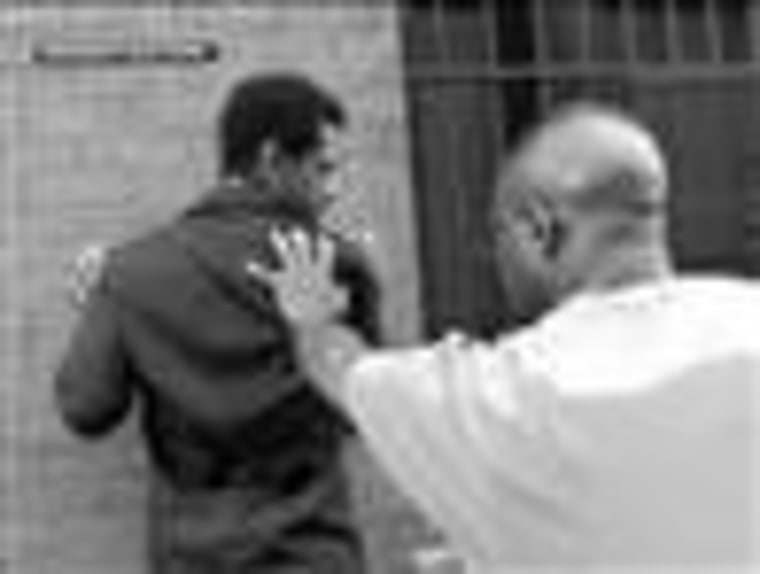"Excuse me sir, can I speak to you for a moment?"
He takes me by the arm in a way that only a man carrying a gun can. Not exactly pushing you up against a wall, but certainly steering you towards it - checking your chest, waist, back for a weapon.
"Do you live in this neighborhood? Oh, yeah? Why don't you show me where you live? We'll go there right now."
It's not a threat, but it's meant to sound like one.
I'm doing a run-through before Touré arrives on our shoot in Brooklyn. And even though I know it isn't real, I'm still uncomfortable.
Our two former officers give us a feel for how and why Stop & Frisk is used. It takes guns off the street, they check for weapons, but don't violate individual rights, it's a tool for public safety. Of course, that's when it's used correctly and lawfully.
With nearly 700,000 executions of the practice last year alone, it's impossible to know how often somebody's rights were violated. But with nearly 90% of the stops happening to Blacks and Hispanics - I have a feeling it's a little more often than anybody with a badge would like to admit. The former officers helping us with the shoot are great. They've worked both sides to the fence, on the street and in community relations. One of them even worked for Internal Affairs, catching criminals and violators within the force. But none of that closes that gap between the experience relayed by the officers, that the experience as relayed by the citizens.
After putting Touré through a battery of both stops and frisks, we turn our attention to a couple of locals. These are guys from Touré's neighborhood, on a quiet street in Brooklyn. They relay the Stop & Frisk system as they've experienced it.
"He said open your legs, and he started kicking the inside of my shoe so hard that it cracked the sole of my shoe in half."
They talk about being targeted, being degraded, and even being abused. They laughed at the "frisk" that Touré received, jokingly calling it "polite" and "TV friendly." In their neighborhood, they say - the police enter their building's courtyard, using a key to break up family barbecues. They tell me police throw them off their own stoops in broad daylight, for no reason at all. Now obviously, I didn't see any of these things happen. I can't verify them under oath, but the frustration leaks out of them as they talk. These are not stories of anomaly. There is no trace of, "Man I can't believe that happened." There's an inescapability to these stories, it's built into their lives - almost routine. Each of them count up the times they've been stopped: four, five, six, seven...
I try to break some tension by telling them about the time I was Stopped and Frisked. Walking out of a basketball game up on 106th st. and Madison Avenue - two officers roll up, pull onto the curb and start asking me who I am, where I live. They ask where I'm coming from - I look down at the basketball under my arm, and back at them.
They flipped my duffel bag. I told them I was "pretty sure" they couldn't do that... but decided to let them find empty water bottles, Gatorade, and sweaty tee shirts. The officers tell me I fit the description of a few people that have been wandering into the neighborhood looking to buy drugs. I have to assume the description was "White" - because the police didn't say a word to the four Black men I was walking with (who were more than happy to bid me goodnight and head home).
I asked the cops for a ride home, they declined... but they laughed a little. And that's the end of the story. It's probably funnier when I tell it in person, because it's just that - a story. One weird incongruity in a life that never has to think about it again.
Except, even as I relayed this story to Touré's neighbors, I found myself fixating on what should have been a quirky, blip-on-the-radar moment in my life. Rolling it over in my mind, wondering if I'd ever be in that position again. Wondering how my life would have changed if I'd have fought back a little too much, or if I'd been holding a small amount of marijuana, or if I'd been drinking instead of playing basketball...
And then I thought about the men I was telling the story to: Some of them have done jail time, some of them haven't. Some of them have jobs, some of them don't. Maybe some of them are dangerous, maybe not. Maybe they have kids, maybe they have a wife, maybe they're on the brink of doing something horrible, or maybe they're making an honest-to-God effort to be decent, lawful people...
And you know what's interesting?
You can't tell any of those things from the front seat of your patrol car.
